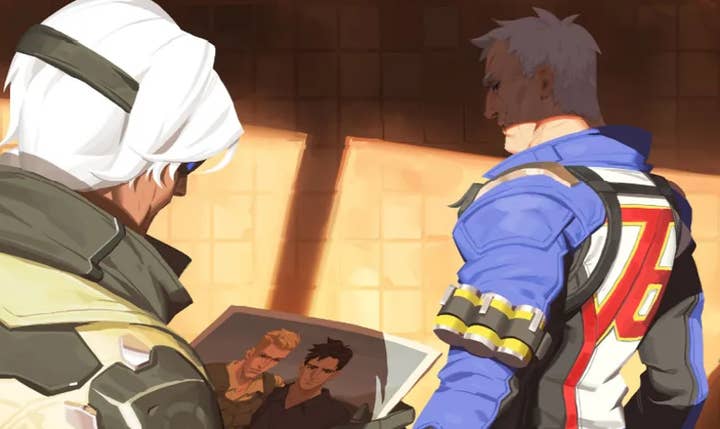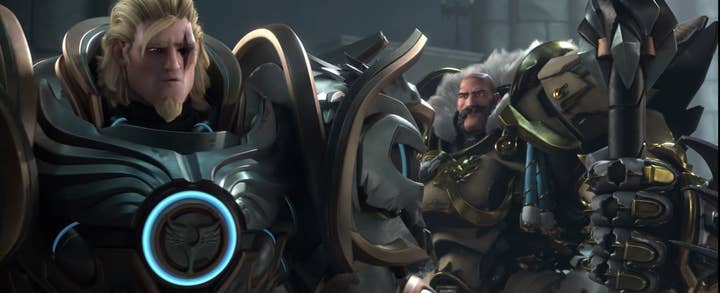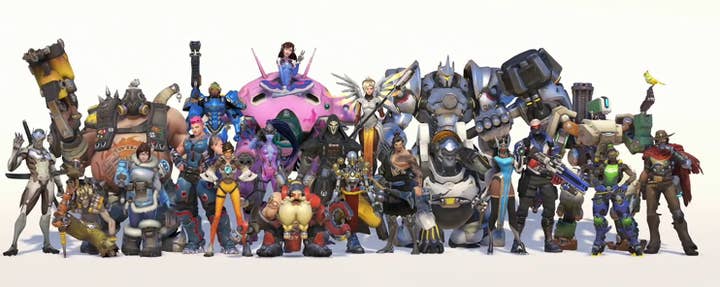Blizzard: "We're crafting stories for a global audience so our team needs to reflect that"
Director of story George Kristic on the Overwatch team's story dojos, lack of yes men, and why he wants more games with animated series
From its very announcement, Overwatch has positioned itself as a beacon of diversity in a games market dominated by the usual grizzled white male power fantasy protagonists.
Blizzard has certainly put effort into delivering on this, with a broad range of heroes to play and backstories that reveal they belong to demographics rarely covered by games. There is still room for improvement, of course -- last year, there was disappointment when new character Ashe was not a black woman as fans had hoped -- but it's clear the ethos of Overwatch was not an empty promise.
Yet sadly, and somewhat predictably, there is resistance in some corners of the fanbase. There was grumbling earlier this year when it was revealed that Soldier: 76 was gay, the second LGBTQ character in the game after Tracer.
"Our story rooms are our dojos. These are our sacred places... We try not to let the negativity enter the dojo"
During a keynote at last week's Reboot Develop conference, Blizzard's director of story George Krstic was asked if the negativity -- whether it's directed at an Overwatch character, a World of Warcraft expansion, or another project -- ever directly influences a story the developers are trying to tell.
"It varies game by game and project by project," he said. "Specifically with WoW, our creative director Alex [Afrasiabi] said a wonderful thing, he said our story rooms are our dojos. These are our sacred places and we try to tell the stories as best we can and make our players as happy as we can. But we try not to let the negativity enter the dojo. You clear your mind, focus your mind, do good work.
"Do we listen to our players and our fans? Absolutely. But we also try not to let that distract us from our end goal of the expansion or the new patch and so on. We have a plan. We are listening but also those voices can get pretty loud."
Krstic went on to stress how important diversity is to the Blizzard team, particularly on Overwatch, and said this even informs the formation of the team.
"That definitely began before I started, and Overwatch is one of the physical manifestations of that. I remember Jeff Kaplan [Overwatch director] during one of his interviews -- this was before I joined the company -- was saying that his hope was everyone can see something within Overwatch that resonates with them, whether it's a story, a character or a backstory. I thought that was awesome, that really made me excited to be part of the company.

"Internally, as storytellers, we're now crafting stories for a global audience and our team needs to reflect that. We have people with various backgrounds, various POVs, and I really love that in our rooms it's not all one voice. We're not all one people. I found that sometimes that can be challenging when you're trying to land a story, but it also makes the story that much better. We don't have yes men or yes women in our story rooms -- it's more like, 'No, can we make it better?' or 'No, I need to challenge that.' It definitely keeps us on our toes, but it makes the story that much better."
"We don't have yes men or yes women in our story rooms - it's more like, 'No, can we make it better?' It definitely keeps us on our toes, but it makes the story that much better"
He also noted that Blizzard has seen a rise in the number of women both playing and making its games. Krstic admits he doesn't know whether these women were already out there playing multiplayer shooters but not speaking out about it, or whether Overwatch has genuinely created a new audience, but he would be "intrigued to find out."
"I do know that when we've spoken to our female players, some of them interact in different ways with our IP," he said. "Some fans will just watch the animated shorts and read the comics. Some of them just play the game. I'm happy to see we've reached new and different audiences in new and different ways. We're going to continue to try to do that."
Earlier in the session, Krstic said that one of the reasons he came to Blizzard was because it was making these animated shorts and other ancillary material around Overwatch that "speaks to character motivation and backstory, things you cannot usually [deliver] in a first-person shooter."
He said: "In many ways, Blizzard was taking new chances and risks... where they did not damage the gameplay but they found a way to still convey story to players -- and the two seemed to work pretty well. That's something we're continually trying to do, and one of our pillars is 'gameplay first'. If the game isn't fun, there's no point building worlds or stories around it. We've found this wonderful balance where we get to work with the game team where they bring game mechanics to us and we bring story to them so the two are pretty complementary, working hand in hand."

Krstic said Blizzard's transmedia plans are "evolving" although wasn't able to give specifics on this. He did say his own team is working a lot on comics, novels, more animated shorts and even audio dramas, and the potential to tell stories outside of games is something Blizzard continues to explore. A Warcraft novel published a few months ago, for example, appeared in the New York Times bestseller list, and the publisher is keen to build on this success.
During a Q&A at the end of the keynote, a member of the audience asked Krstic for his thoughts on other games-based animated series -- particularly the crowdfunded animated special of Critical Role, a series of livestreamed tabletop gaming sessions between several voice actors, that is now in development.
"I want animated series for all games, for games that I love, that you love, for games that I work on and have previously worked on," said Krstic. "I think I speak for many players when I say that we want to interact with these games in different ways. Wouldn't it be great if you can play a game, then jump on Netflix and binge and entire series based on it?
"I think we're moving in that direction, and I think [Critical Role] was a grassroots way of doing that. The industry has woken up, the Eye of Sauron is upon them, and I think a lot of people will be watching what they do with Critical Role. I think this is the beginning of many animated series coming your way, for better or worse. It's already started on Netflix, we had Castlevania and there's a few other series in development. It's an exciting time for animation in games and inspired by games."
GamesIndustry.biz is a media partner of Reboot Develop and attended the conference with the assistance of the organisers.

